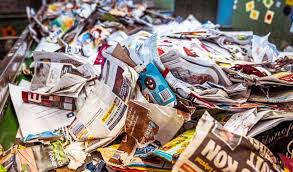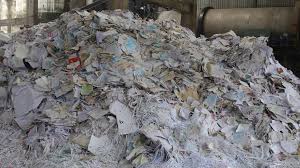Paper waste refers to any discarded or unused paper materials. It includes things like newspapers, old documents, magazines, and packaging that are no longer needed and are thrown away.
Paper is a versatile and essential part of our daily lives. We use it for writing, printing, packaging, and more. However, with the convenience of paper comes the challenge of dealing with paper waste. Let’s explore what paper waste is, its impact on the environment, and how we can make a positive change.
What is Paper Waste?
Paper waste, simply put, is paper that has been discarded or is no longer needed. It includes items like newspapers, old documents, cardboard boxes, magazines, and even junk mail. When these items are thrown away, they become part of the paper waste problem.
Solutions to Reduce Paper Waste
1. Reduce and Reuse: Use both sides of a sheet of paper before discarding it. Reuse old envelopes and boxes for shipping or storage.
2. Paperless Options: Embrace digital documents and e-books to reduce the need for printing.
3. Recycling: Place paper waste in recycling bins to ensure it gets a second life. Support recycling programs in your community.
4. Eco-friendly Paper: Choose recycled or sustainably sourced paper products when you need to use paper.
5. Education and Awareness: Spread the word about paper waste and its impact to encourage responsible paper use.
Paper waste is a global issue with environmental consequences, but each of us can make a difference. By reducing, reusing, recycling, and choosing eco-friendly paper options, we can contribute to a more sustainable future. Let’s take small steps today to preserve our forests, conserve resources, and reduce the burden of paper waste on our planet.
Read Also: Exploring the Benefits of Plastic Waste
The Importance of Paper Waste

Paper, a fundamental part of our lives, plays an indispensable role in communication, education, and countless daily activities. However, the importance of paper waste lies in recognizing the delicate balance between its essential uses and the responsibility to manage it sustainably. In this article, we will delve into why understanding and addressing paper waste is crucial for the well-being of our planet.
1. Resource Conservation: Paper production relies heavily on trees, water, and energy. By reducing paper waste, we help conserve these valuable resources. Each ton of recycled paper can save 17 trees, 7,000 gallons of water, and a significant amount of energy compared to making paper from raw materials.
2. Mitigating Deforestation: Excessive paper waste exacerbates deforestation, which has severe consequences for biodiversity and the climate. Forests are vital for absorbing carbon dioxide and providing habitat for countless species. When we waste paper, we contribute to the destruction of these essential ecosystems.
3. Energy and Water Efficiency: The paper production process is resource-intensive. Reducing paper waste helps decrease the energy and water consumption associated with manufacturing new paper products. This efficiency leads to reduced greenhouse gas emissions and water pollution.
4. Landfill Reduction: When paper waste is not recycled, it often ends up in landfills, where it decomposes slowly and emits methane, a potent greenhouse gas. By diverting paper from landfills through recycling efforts, we help mitigate this environmental impact.
5. Economic Benefits: Managing paper waste creates jobs in recycling and waste management industries. Additionally, recycling paper reduces the need for raw materials, which can stabilize prices and reduce the economic burden of acquiring new resources.
6. Promoting Sustainable Practices: Focusing on paper waste encourages individuals, businesses, and governments to adopt sustainable practices. This includes choosing recycled or responsibly sourced paper products, using digital alternatives when possible, and supporting recycling programs.
7. Educational Opportunities: Teaching about paper waste and its consequences provides valuable lessons in environmental responsibility. It fosters awareness and encourages future generations to make environmentally conscious choices.
The importance of paper waste lies in our ability to strike a balance between the vital role paper plays in our lives and our responsibility to manage it sustainably. By reducing, reusing, recycling, and supporting eco-friendly paper products, we can minimize the negative impacts of paper waste on our environment and create a more sustainable and responsible future.
Recognizing the significance of paper waste is the first step toward preserving our planet’s natural resources and protecting the ecosystems that depend on them.
Read Also: Exploring the Benefits of Lightbulb Waste
The Impact of Paper Waste

Paper waste may seem harmless, but its impact on our environment is far-reaching. In this article, we’ll explore the consequences of paper waste in simple terms, shedding light on why it’s important to address this issue.
1. Deforestation: When we waste paper, we indirectly contribute to deforestation. Paper production requires trees, and the more paper we waste, the more trees need to be cut down. This harms our forests, disrupts ecosystems, and reduces the planet’s capacity to absorb carbon dioxide.
2. Resource Depletion: Making paper isn’t just about trees; it also consumes massive amounts of water and energy. The more paper we waste, the more we strain these resources, which are essential for life and have their environmental costs.
3. Landfills and Methane: Paper waste often ends up in landfills. Here, it decomposes slowly and releases methane, a potent greenhouse gas that contributes to climate change. So, paper waste isn’t just taking up space; it’s also harming our atmosphere.
4. Energy and Pollution: The paper-making process generates pollution and requires a lot of energy. By wasting paper, we indirectly contribute to pollution and greenhouse gas emissions, exacerbating environmental issues.
5. Lost Recycling Opportunities: Paper is one of the most recyclable materials. When we throw it away instead of recycling, we miss a chance to reduce the need for raw materials, save energy, and decrease pollution.
6. Habitat Destruction: Deforestation caused by paper production destroys the homes of countless wildlife species. Many animals and plants depend on forests for survival, and when these habitats disappear, so do they.
7. Climate Change: The environmental consequences of paper waste, from deforestation to landfill emissions, contribute to climate change. As the planet warms, we experience more extreme weather events, rising sea levels, and other serious problems.
Paper waste is not just about crumpled documents or old newspapers; it’s about the environmental impact of our choices. Recognizing the consequences of paper waste is the first step toward change.
By reducing paper use, recycling, and choosing eco-friendly paper products, we can help mitigate the negative effects of paper waste on our planet. Every small action counts towards a more sustainable future.
Read Also: 20 Medicinal Health Benefits of Griffonia Simplicifolia (Griffonia)

